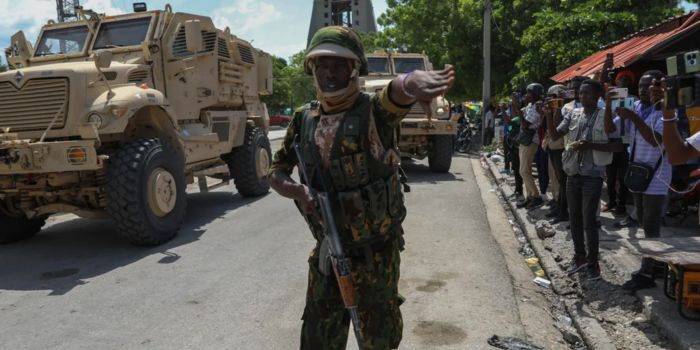A killing spree has left at least 150 people dead in a village liberated by Kenyan and Haitian police, according to media reports. Reports from Haiti indicate that the area descended into a bloodbath after the police rolled into the area.
The small farming town north of the Haitian capital, Port-au-Prince, witnessed what has been described as morbid and ruthless killings as two sides fought in revenge attacks.
The area liberated in October by the Kenyan and Haitian troops marked a rare victory after a wave of setbacks in Haiti’s war against gangs. When the police rolled into the town with armoured cars, they were welcomed with cheers, dancing, and waving tree branches by the residents.
The residents could not hide their joy after enduring two years of gang attacks, land grabbing, and livestock theft all at gunpoint. However, the relief, according to media reports, was short-lived. After police reclaimed control of the area on Saturday, what followed was bloody violence.
President William Ruto interacting with Kenya Police officers in Haiti, September 2024.
Photo
PSC
Armed members of the Savien Gran Grief and Palmis gangs launched brutal attacks on residents in a vengeful strike. Meanwhile, a self-proclaimed citizens’ defense group responded with machetes and knives, targeting suspected gang members and their supporters.
The violence, which lasted for three days, has claimed at least 150 lives, according to a local community leader. He shared harrowing images and videos of the aftermath, showing burnt homes, bloodied streets, and a river littered with mutilated bodies—many dismembered, with limbs severed.
“I am in Ti-Rivière… I couldn’t walk before. Now I am walking in the bush. I am not scared. They are all thieves,” a voice says on one of the videos that shows several corpses, arms hacked off, floating in a river.
“We’re in a non-declared civil war,” said Horace, the spokesperson with the Commission for Dialogue Reconciliation and Awareness to Save the Artibonite.
“The people are the collateral damage. They are the victims.” Horace said most of the killings were carried out by members of the citizens’ defense group, which took advantage of the police presence to take justice into its own hands.
From Sunday to Tuesday, residents were forcibly dragged from their homes and off the streets, brutally hacked to death with machetes and knives, according to the community leader.
The victims were accused of being allies of the Gran Grif and Palmis gangs, which had joined forces to block police intervention. The vigilante group showed no regard for the victims’ innocence or whether they had been forced to cooperate with the gangs, she added.
On Thursday, Multinational Security Support (MSS) Mission Commander, Godfrey Otunge, dismissed allegations of misunderstandings between the Kenyan peacekeepers and the Haitian National Police (HPS).
Speaking on Thursday, December 12, during the Jamhuri Day celebrations held by the Kenyan officers in the Caribbean nation, Otunge described the allegations as propaganda aimed at derailing the peacekeeping mission.
He emphasised the harmonious and productive relationship between the two forces, reiterating the mission’s unwavering support for the Haitian people in combating gang violence and fostering a safe environment ahead of the elections.
The mission has been plagued by a litany of complaints that have resulted in some officers wanting to quit. Otunge has refuted these claims.
Commander of the Kenya Police in Haiti and Senior Assistant Inspector General of Police, Godfrey Otunge on June 26, 2024
Photo
Clarens Siffroy


